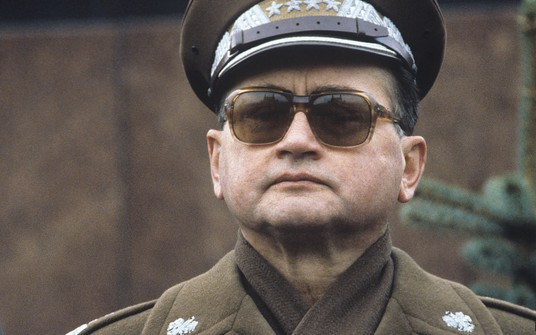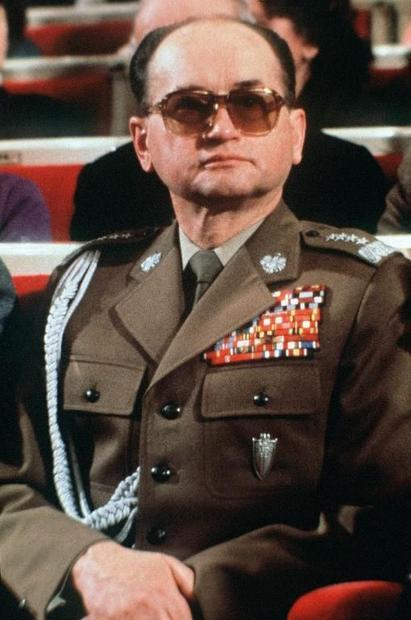
He was the last Communist leader of Poland. He imposed martial law deadly to around 100 civilians, jailed thousands and banned Solidarity. Still many poles waver in their judgement of General Wojciech Jaruzelski.
A survey in 2007 showed that 44% poles believed Jaruzelski had no choice but to impose martial law in 1981, while 45% condemn his actions. Until his death in 2014 Jaruzelski worked hard to ensure history judged him gently, and tireless maintained he was a patriot, that led Poland on the path of democracy and reconciliation.
On August 7. 1980, Leonid Brezhnev held a meeting with Bulgarian Communist leader of Bulgaria Todor Zhivkov. 36 years as first secretary of a cold war mastodon had been hard on Brezhnev whose appearance had turned ravaged and drowsy. The old comrade still had his iron fist, though. He demands the Polish leader, Stanislaw Kania, confront the enemy and crack down the growing uprising. A disastrous economy, strikes and the emerge of Solidarity had crippled socialist Poland by 1980/81. Zhivkov states, he thinks Kania shows fear and Brezhnev replied: “Yes, Kania turned out to be a coward”. Two months later Kania was gone. Removed. Moscow cast his successor to fill out the role of an unbending strong man. That man was General Jaruzelski’s and it defined his legacy that he commanded tanks out on the streets and on December 16, three days after the martial law introduction ordered the army to the Wujek coal mine in Katowice where it shot nine striking miners to death.
Jaruzelski’s Many Burdens
“ There was constant, psychologically draining and exhausting pressure. Our country was in great danger ”, Jaruzelski on the 1981 martial law, 2009.
Jaruzelski cracked down the first democratic movement in the Eastern bloc by extensive imprisonment including Solidarity’s prominent leader and later President of Poland, Lech Walesa. Jaruzelski banned the Solidarity, oppressed Polish citizens and justified it as needed to prevent a greater evil that had been a Soviet invasion of Poland.
“ Historically, Solidarity was right, but we were situational correct at the time ”, Jaruzelski on Solidarity’s criminalization, 2009.
Speculations on whether Jaruzelski, if necessary, wanted a Soviet invasion have been discussed throughout the years. Such an act would likely be regarded as high-treason in court. Jaruzelski himself always denied the accusations, emphasizing that his actions were the opposite.
“ I did not say the words requesting the introduction of Soviet troops. I calculated that we would settle this with our own resources. … Look at how the martial law occurred. It went by, one might say, smoothly. There were hardly even any strikes. The Polish army was respected and we knew that ”, Jaruzelski on high-treason accusations, 2009.

The stiff-backed general with tinted glasses lacked appearance in the form of a warm embracing national father’s figure, but nailed the looks of a mysterious demagogue. In December 2009 an interesting document was published with the great accusation that Jaruzelski actually asked Marshal Viktor Kulikov, Warsaw Commander-in-Chief, to invade his country if necessary. The document reveals strikes were considered controllable by the Polish regime. On the contrary, Jaruzelski feared organized demonstrations and attacks on local party committees.”If this spreads to the entire country, you will have to help us”, he told Kulikov. “We can’t handle this alone”. The document proved to be part of a notebook that was used by an assistant who traveled to Poland with Marshal Kulikov shortly before Jaruzelski introduced martial law. Kulikov visited Poland 21 times in 1981 with his entourage. Mark Kramer, director of the Cold War Studies at Harvard University, is considering Jaruzelski’s claim that he acted to avoid Soviet invasion to be false. Kramer reviewed numerous Polish, Soviet and CIA documents with evidence of Jaruzelski’s wanted Soviet troops to help him with the crisis. A key point in Mark Kramer’s assertions is that, through his extensive research, he never found any documents that supported Jaruzelski’s own claims. In fact, he only saw evidence of the opposite. A transcript of a meeting in the Soviet Politburo on 10 December 1981 shows how strongly Soviet leadership rejected Jaruzelski’s wish for military intervention, even though the crisis in Poland worsened. Yuri Andropov, later leader of the Soviet Union, had a clear attitude. “We do not intend to introduce troops into Poland. … Even if Poland falls under the control of Solidarity, that’s the way it will be”. Instead, Andropov was keen on strengthening the Soviet Union rather than saving a socialist satellite state. Historian Vojtech Mastny claims Jaruzelski’s fear of losing power far overshadowed his patriotism. He emphasizes the biggest concern in Jaruzelski’s correspondence with Moscow was attack on “party committees”, which Mastny believes reveals the truth of Jaruzelskis’s patriotism’ was to preserve Communist rule in Poland at all costs.

Transcript copy from a Soviet Politburo in which military intervention is rejected.
Five Speeches and One Conference
In 2016, internal speeches from Communist leaders in the Warsaw Pact’s Political Consultative Committee (PPC) meetings between 1956 and 1990 were published by the Parallel History Project on Cooperative Security (PHP). The PHP documents give a rare insight into Jaruzelski’s views on domestic affairs, as he reported to his Communist colleagues. Jaruzelski participated in seven PCC meetings from 1983 to 1989. Five of his talks are available in the PHP archive. The speeches of 1984 and 1988 are missing. Over the years at each meeting, Jaruzelski deepened the domestic situation in Poland, the development of Solidarity and, in fact, how alarmed politburo’s from East Berlin to Sofia should be.
Jaruzelski’s speech at the PCC meeting in Prague 1983: Is dominated by the crisis in Poland. Jaruzelski pronounces how Western influence specifically targeted Poland caused turmoil in Polish society around 1980/81. Economic sanctions implemented by the Reagan administration (reaction to the Wujek Coal Mine massacre) and an overall aggressive foreign policy by Americans and West Germany destabilize and threaten world peace. Jaruzelski does not directly mention the martial law, but says how he “Intends to prevent Western influence from Poland”. Erich Honecker, leader of the GDR, praised personal efforts made by Jaruzelski and that he: “Single-handedly invoking people’s right to self-determination, taken measures of 13 December 1981”.
Sofia, 1985: Mikhail Gorbachev participates as newly appointed leader of the Soviet Union. His Glasnost reform is praised by Jaruzelski, who says there is a need for new thoughts in some areas of society. Jaruzelski points out: “The necessity of toning down and respond to Western propaganda regarding human rights in the Eastern bloc”.
Budapest, 1986: Jaruzelski is focusing on the Reagan administration again and its confrontational course, which creates a new stage in the weapons campaign. He warns of the expansion of imperialism. “Guided by the Leninist analysis of imperialism, we have never had any illusions about its character”. He opposes claims of communist political thoughts as not being realistic and how propagandist aggression from the West must be closely monitored. Jaruzelski concludes: “Our Polish experience in the heated struggle in recent years confirms that it is not only possible to mask and reject enemy attacks but also to hit the weak points of opponents too.”
East Berlin, 1987: Jaruzelski hails Perestroika as ‘new thinking’ and integral to world peace. Economic sanction has been lifted some by the Americans which Jaruzelski acknowledges, before stating; “Economic discrimination, aggressive propaganda, and various forms of subversion against socialist Poland have continued”.
Note: Between these two PCC meetings, the so-called ‘Round table talks’ had started in the summer of 1988 between the Polish Communist Party and Solidarity.
Bucharest, 1989: Jaruzelski speaks of the danger of “Influence of neo-fascist forces” and “revanchist invectives”. He briefly mentions the democratization process taking place in Poland as part of socialist renewal and a path with dangers, but at the same time the only option to save Poland’s economy and secure peace.
The PHP documents do not shed light on remorse or moral reflections made by Jaruzelski. In long, clumsy Communist bureaucracy sentences, the West is blamed for the actions taken during his 8 year tenure as Polish leader. A run-down economy, criticism of the Communist system and of human rights violations are considered subversions committed by an external enemy. Paranoia is ever-present and elitist thirst for power permeate all PHP documents. In a 1993 interview, Jaruzelski regretted the martial law.
“ I deeply regret it. It is a great burden for me, and it will be until the end of my days ”.

Jachranka Conference, 1997: In order to investigate the Soviet role in the Polish crisis in 1980-81, a conference was held in Jachranka, where Polish and Soviet communists, Solidarity members and an American delegation participated. John S. Micgiel of Columbia University observed the conference. The controversy regarding Jaruzelski’s actions, role and statements remained after the conference. Stanislaw Kania and Zbigniew Brzezinski (Polish-American diplomat) stated that Soviet invasion campaigns had been discarded before Jaruzelski came to power. Marshal Viktor Kulikov denied any plans for Soviet intervention in Poland existed even in 1980. On the other hand, Jaruzelski and Florian Siwicki (defence minister at the time) maintained the Soviets was prepared for invasion all the time. During the conference, Jaruzelski seemed pressured, visibly affected, and although he willingly commented during the 3 days the conference lasted, he evaded many direct questions, Micgiel noted.
National Hero or National Villain
For 586 days General Wojciech Jaruzelski forced his fellow-countrymen to live with tanks and armed troops on the streets, curfew and dead phone lines. Several documents suggest Jaruzelski personally made request for a Soviet intervention. If the communist regime was about to collapse he wanted a military support from the Soviet Union. Former secret documents from an assistant who traveled with Marshal Kulikov fell into the hands of Mark Kramer, director of the Project on Cold War Studies at Harvard University. They suggests Jaruzelski himself decided to impose martial law and more than once requested Moscow for help in order to handle the rebellion. At the 1997 Jachranka conference, Jaruzelski’s Soviet colleagues both Marshal Kulikov and General Gribkov, claimed Jaruzelski knew there would be no Soviet ‘assistance’ as in the case of Czechoslovakia in 1968. “Documents presented bear this out”, Micgiel noticed. Lots of documents indicate Jaruzelski is guilty of high-treason having requested Soviet troops to invade Poland if his communist regime collapsed. Furthermore, guilty of violations of human rights, killed civilians, oppressing religious and fundamental freedom rights from December 1981 until June 1989, where communism lost their grip on Poland.
Undoubtedly, Jaruzelski felt the pressure from Moscow and he acted in a divided world that he had not divided. Perhaps that’s why his sake remains foggy and indecisive for many poles. If Jaruzelski was a patriot, we must trust his words because it stands alone in support of his testimony.
“I leave God to pass final judgement on Wojciech Jaruzelski”, Lech Walesa said about his old foe when he was buried with full military honours. In death as in life, General Wojciech Jaruzelski divides Poland.

